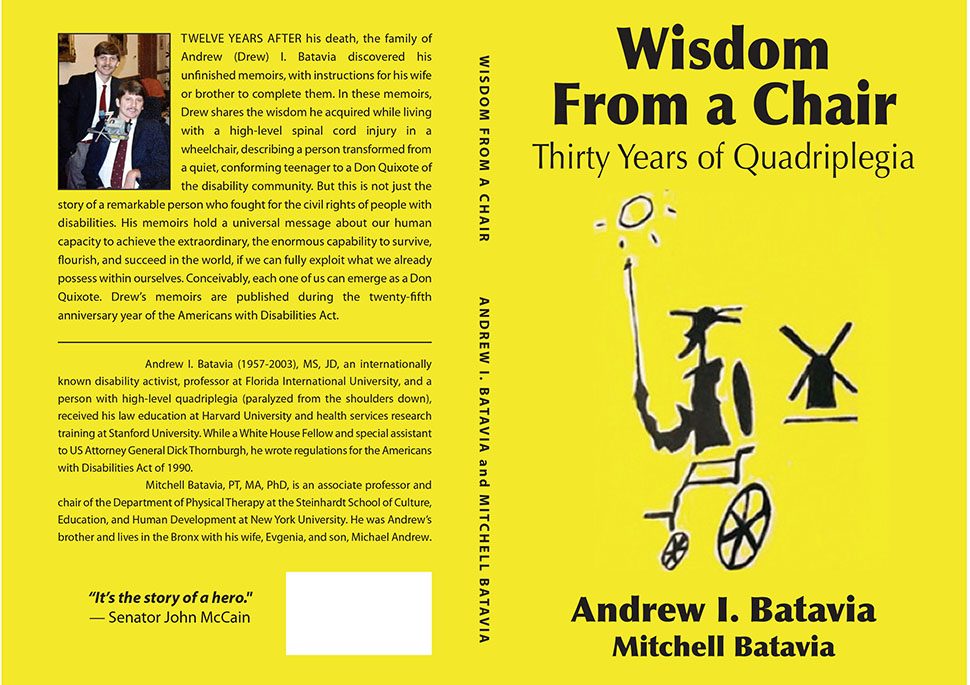If you pay attention to the debates about death with dignity, be it in state legislative hearings, in the media, or online, you would be hard-pressed to avoid thinking that people with disabilities oppose assisted dying.
You would be far from the truth.
Many advocates for physician-assisted death who have disabilities, like Joan Tollifson or the late Paul Spiers, have pointed out that the opponents of assisted death among the people with disabilities do not represent or speak for all of their peers (in fact, Spiers said, “polls show a majority of the disability community favors passage of laws providing choice at the end of life”).
One such person was Andrew I. Batavia, a former board member, from 1997 to 2002, of our predecessor organization, Oregon Death with Dignity. Andrew was paralyzed and rendered quadriplegic in a car crash when he was sixteen. He then dedicated his adult life and an illustrious career to advocating for people with disabilities.
He graduated from Harvard and Stanford and worked as a Justice Department attorney, health policy researcher, and disability rights activist.
A Republican since 1990 when he became a White House Fellow, Andrew helped write and developed policies for the Americans with Disabilities Act, or ADA (it was President George H.W. Bush’s support for the Act that he credited for his adherence to the conservative creed).
Andrew was also a prolific writer: he authored 69 peer-reviewed articles, three books, 13 chapters for edited volumes, and 23 letters-to-the-editor, among other writings.
After his death, in 2003, Andrew’s brother Mitchell discovered a draft of his memoirs and completed them. A quarter-century after the passage of the ADA, Andrew’s final work has just been published as Wisdom from a Chair: Thirty Years of Quadruplegia.

In the book, Andrew recounts his journey from his accident to his final place of residence, in Florida. Following his work on ADA regulations and other disability-rights issues, he took on physician-assisted dying. For example, he authored several articles about physician-assisted dying.
Using his legal expertise, he also wrote amicus curiae briefs, including in Oregon v. Ashcroft, in which the Supreme Court of the United States ultimately decided that the practice of medicine, including physician-assisted dying, should be left to states, a ruling which effectively upheld the Oregon Death with Dignity Act.
People with disabilities who support the right [to die], including myself, focus primarily on the autonomy and self-determination of the individual with a disability.
In 2002, Andrew founded Autonomy, Inc., a now-defunct nonprofit “representing people with disabilities who wanted choices and control over their lives, including end-of-life decisions” (Paul Spiers was Autonomy’s executive director after Andrew Batavia). Using the principle of personal autonomy, he and the organization continued advocating for the right of terminally ill people with disabilities to make their own end-of-life decisions, including choosing physician-assisted death.
When Andrew I. Batavia died in 2003 in Florida (in his brother’s words, “peacefully, with dignity, and in the manner he wished”), the death with dignity movement lost a champion and a leader. Thanks to his autobiography, we can glean a lot not just about his life but also about his thinking and experience.
Wisdom from a Chair: Thirty Years of Quadruplegia is available at Amazon and other online booksellers.

One comment.
Book Review from Death with Dignity Organization – Wisdom From a Chair
[…] A Review of Wisdom from a Chair: Thirty Years of Quadruplegia […]
Comments are closed.